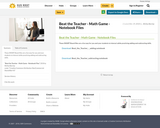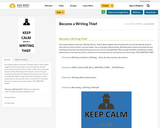
Essential Question: How did The Beatles establish a new paradigm for the image of "the star," and how did that image support their global success?
- Subject:
- Arts Education
- Band
- Material Type:
- Unit of Study
- Provider:
- TeachRock
- Date Added:
- 10/08/2019

Essential Question: How did The Beatles establish a new paradigm for the image of "the star," and how did that image support their global success?

In this lesson, students learn about the Beatles active stance against segregation and consider what the band's example meant for an emerging youth culture.

This lesson explores first the role Brian Epstein played in helping craft The Beatles' visual presence, group identity and team unity, the way he helped the group transition from successful nightclub act to international sensation.

By the end of their 1966 summer tour, The Beatles had grown weary of the live concert setting. Concurrently, they had become increasingly comfortable within, and inspired by the possibilities of the recording studio. In the fall of 1966, in a culminating moment, The Beatles announced that they would no longer tour and would instead focus their creative energy on making records.

"In Beats Empire, students act as music producers in a studio where they sign new artists, direct the bands to record songs, perform market research and marketing, and try to produce hits, gaining enough profit to keep the studio running and to pay the talent. The goal of the game is to get a gold record (500,000+ sales) in every music genre or to earn three platinum records (1,000,000+ sales) in any one genre, all without running out of money."

These SMART Board files are a fun way for you and your students to interact while practicing adding and subtracting skills.

In this 1-2 week engineering design lesson, students will design and build water filters out of natural materials to simulate a filter system (bioswales) that cleans storm-water runoff before it soaks into the ground or enters a city’s storm-drain system. Their ultimate goal is to determine the combination and sequence of materials that best clean polluted water. Using materials easily found in pet stores and garden centers, students use the scientific method, students design to test and retest their designs and record, display and analyze their results.

Science writer Margaret Wertheim re-creates the creatures of the coral reefs using a technique invented by a mathematician -- simultaneously celebrating the amazements of the reef, and deep-diving into the hyperbolic underpinnings of coral creation. A quiz, thought provoking question, and links for further study are provided to create a lesson around the 15-minute video. Educators may use the platform to easily "Flip" or create their own lesson for use with their students of any age or level.

In this visually dazzling talk, Jonathan Drori shows the extraordinary ways flowering plants -- over a quarter million species -- have evolved to attract insects to spread their pollen: growing 'landing-strips' to guide the insects in, shining in ultraviolet, building elaborate traps, and even mimicking other insects in heat. Jonathan Drori commissioned the BBC's very first websites, one highlight in a long career devoted to online culture and educational media -- and understanding how we learn. A quiz, thought provoking question, and links for further study are provided to create a lesson around the 14-minute video. Educators may use the platform to easily "Flip" or create their own lesson for use with their students of any age or level.

A Prince must find a girl who will love him, in spite of his frightening curse.

David McCandless turns complex data sets (like worldwide military spending, media buzz, Facebook status updates) into beautiful, simple diagrams that tease out unseen patterns and connections. Good design, he suggests, is the best way to navigate information glut -- and it may just change the way we see the world. A quiz, thought provoking question, and links for further study are provided to create a lesson around the 18-minute video. Educators may use the platform to easily "Flip" or create their own lesson for use with their students of any age or level.

Discover all that the Meewasin Valley Authority with a variety of different options in programming from grades 3-6.
Grade 3 Ecology Programs – Northeast Swale
Explore Nature in the City! The Grade 3 Program at the Northeast Swale is a half-day of learning in a unique prairie wetland habitat. This program includes a nature hike in the ecological core of the Northeast Swale and features the exploration of ecosystem connections, identification of grassland plants and wildlife, nature mindfulness, and discussions of Indigenous Worldviews and treaty relationships as well as other place-based learnings.
These half-day programs (9:30 am – 11:30 am OR 12:30 pm – 2:30 pm) are offered in spring (May & June) and fall (September & October).
Grade 4/5/6 Ecology Programs – Beaver Creek Conservation Area
Beaver Creek Ecology programs include a full day of learning out in nature! You and your students will learn about and observe spring/fall migration, and mating and nesting behaviors of common birds at Beaver Creek with a special focus on the resident Black-capped Chickadee. This program also explores the impacts of weather systems on plants and animals, sustainable grassland management, medicinal plant uses, keystone species, predator-prey relationships, and the importance of citizen science.
These full-day programs (10:00 am – 2:30 pm) are offered each spring (April – June) and fall (September – November). We are grateful to SaskPower for their support of Meewasin’s educational programming.
Grade 4/5/6 Cross-Country Ski Program – Beaver Creek Conservation Area
In this full day program, students have an opportunity to feed the resident Black-capped Chickadees at Beaver Creek and to learn about winter adaptations, the importance of snow as habitat, and animal tracks on the open prairie. Students are introduced to cross-country skiing through a short lesson, followed by a 60 – 90 minute ski on the upland prairie with stunning views of the South Saskatchewan River Valley.
This ski trail is both fun and accessible for all skill levels! This full-day program (10:00 am – 2:30 pm) is offered in winter (January – March).

Get ready to get weird. Mike Rugnetta teaches you about the Theater of the Absurd, a 1950s theatrical reaction to the dire world events of the 1940s. You'll learn about Jean Genet, Eugene Ionesco, Samuel Beckett, and the theatrical movement that left us all Waiting for Godot.

Students "become" one of the major characters in a book and describe themselves and other characters, using lists of accurate, powerful adjectives.

Encourage students to become “Writing Thieves” Ruth Culham suggests that we pickpocket our way through the world of print and non-print as writers, not just readers. Be a cat burglar of great writing. Bring the great treasures you find into your teaching and learning. Use things that jump out at you, that are unforgettable. When you get excited by something an author writes about or the way they write it, steal bit of it in the hope that you can improve your own writing –BE A WRITING THIEF!

Is the case closed on the authorship of Shakespeare's plays? Student history detectives explore the evidence for and against one of the possible alternatives, Edward deVere, using the novel Shakespeare's Secret plus a variety of online sources.

Powerpoint presentation on how to Google on the internet

The PhET project at the University of Colorado creates "fun, interactive, research-based simulations of physical phenomena." This particular one deals with Beer's Law. "The thicker the glass, the darker the brew, the less the light that passes through." Make colorful concentrated and dilute solutions and explore how much light they absorb and transmit using a virtual spectrophotometer! The simulation is also paired with a teachers' guide and related resources from PhET. The simulation is also available in multiple languages.

The PhET project at the University of Colorado creates "fun, interactive, research-based simulations of physical phenomena." This particular one deals with Beer's Law. "The thicker the glass, the darker the brew, the less the light that passes through." Make colorful concentrated and dilute solutions and explore how much light they absorb and transmit using a virtual spectrophotometer! The simulation is also paired with a teachers' guide and related resources from PhET. The simulation is also available in multiple languages.

Students will learn the life cycle of a honey bee and their importance to agriculture through pollination.